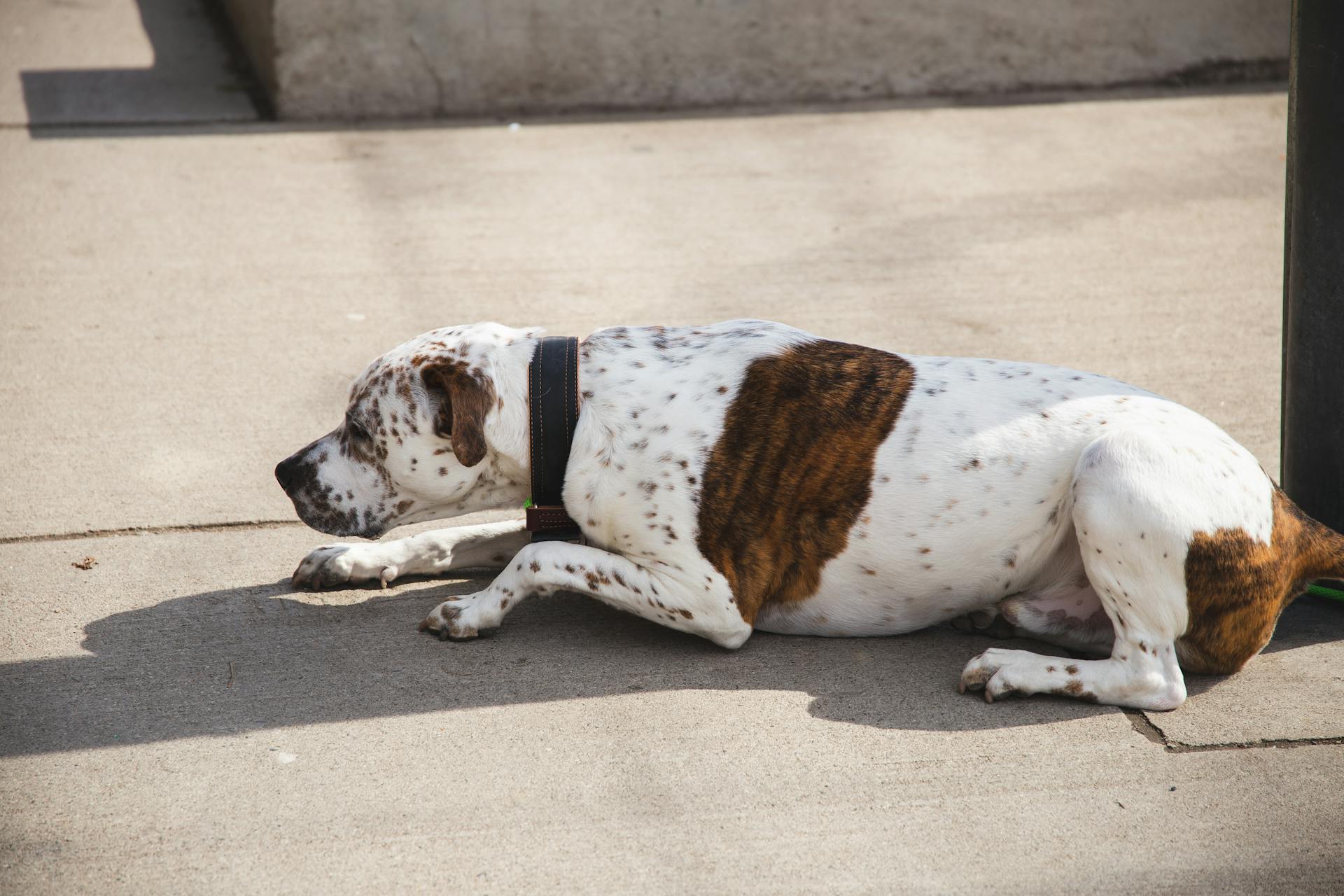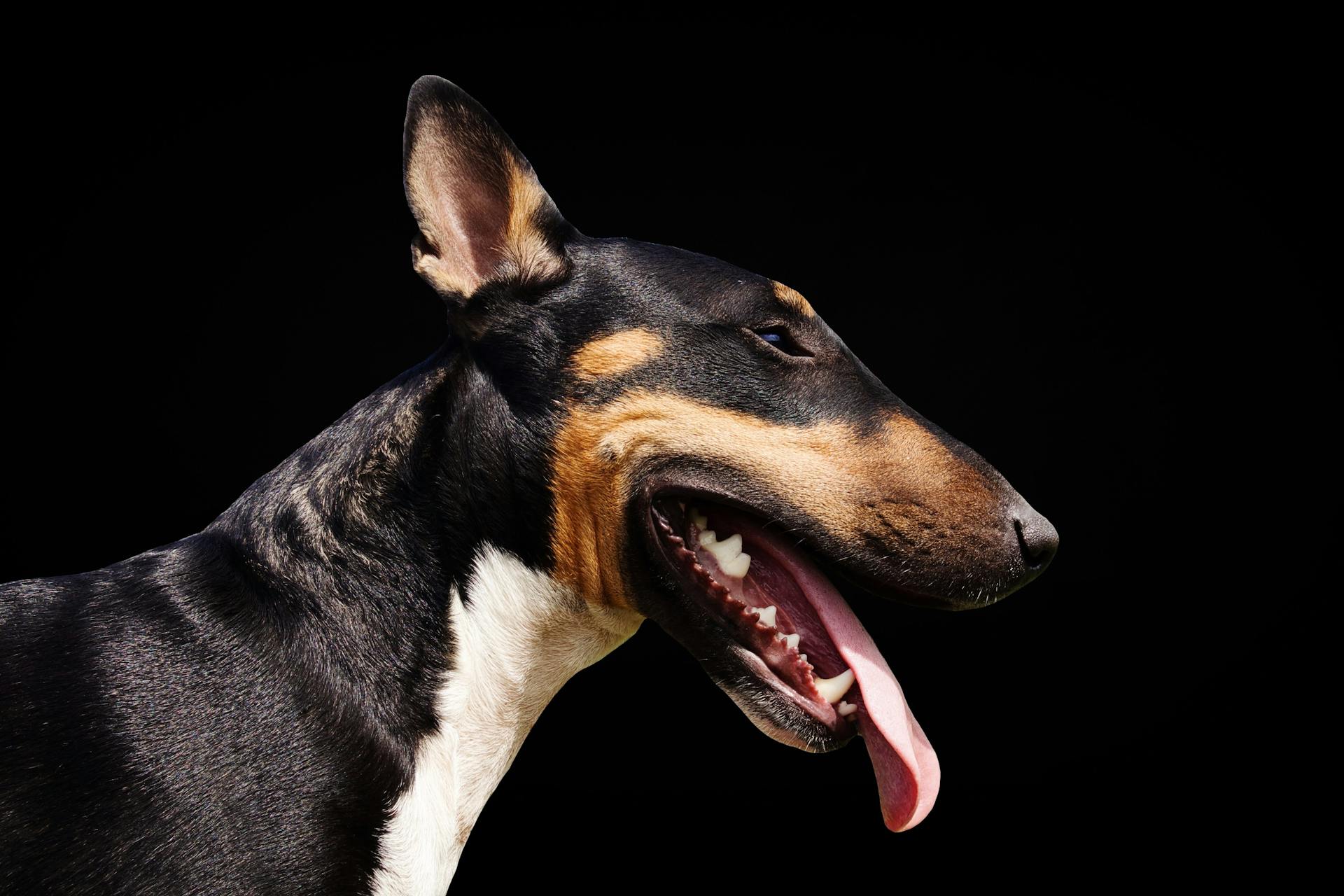
The Telomian dog breed is a rare and unique companion. They are an ancient breed, with origins dating back over 2,000 years to Southeast Asia.
Telomians are highly intelligent dogs, known for their ability to learn quickly and easily. They thrive on mental stimulation and require regular training and exercise.
One of the most distinctive features of the Telomian is their short, smooth coat, which requires minimal grooming. This makes them a great choice for busy owners or those who are new to dog ownership.
Telomians are naturally protective of their families, but they are not generally aggressive and make great family pets.
For another approach, see: Great Dane Irish Wolfhound Mix Puppies
History and Origin
The Telomian dog is an incredibly rare breed, native to the jungles of Malaysia, where it's been used by the Orang Asli indigenous people for centuries.
They were originally bred to catch vermin and snakes, but also helped with hunting, fishing, and herding. They even guarded their families and property.
Their unique ability to climb ladders into their homes, built on stilts, has made them well-adapted to their environment. This has also given them a special talent for opening closed doors!
Dr. Orville Elliot, an American anthropologist, discovered the Telomian in the 1960s and introduced them to the West. He even gave them their name, "Telomian", after the local Telom river.
In 1963, Dr. Elliot brought a pair of Telomians to the United States, marking the beginning of their presence in the West. A Telomian Dog Club was formed in 1970 to promote and breed the dogs.
Their climbing ability also gives them great paw control, allowing them to hold onto food, toys, and even open doors with ease. This is a result of their adapted paws, which have been shaped by years of climbing into their homes.
For more insights, see: Telomian
Physical Characteristics
The Telomian dog is a compact breed with a rectangular body shape. Most adults measure between 38cm to 45cm at the withers.
Their limbs are relatively long and straight, ending in rounded feet with well-arched toes, developed for good dexterity in climbing. Their feet are a testament to their agility.
The Telomian's head is wide and wedge-shaped, with a strong neck and dark brown eyes that are almond in shape and set well back.
Appearance
The Telomian's appearance is quite distinctive, with large and erect ears that are always alert and facing forward. These ears are a characteristic feature of the breed.
Their body is well-muscled and has a tail that curves in with a tip pointing towards their head. This is a key difference between the Telomian and the Basenji, which has a more curled and flat tail.
The Telomian's eyes are dark brown and almond in shape, set well back on their head. They have a unique way of expressing themselves through their facial expressions, which they use to beg for treats!
A different take: German Shorthaired Pointer Tail
Their head is wide and wedge-shaped, while their neck is strong. This combination of features gives them a distinctive look.
Their limbs are relatively long and straight, ending in rounded feet with well-arched toes. This unique foot shape allows them to climb with ease.
The Telomian's fur is quite short and comes in a variety of colors, including dark brown and white, black and white, and tan and white. Some individuals may also have a dark facial mask.
Most adult Telomians measure between 38cm to 45cm at the withers and weigh around 8kg to 12kg.
Size
The Telomian dog is a small to medium-sized breed.
The average height of the Telomian dog is between 15-19 inches.
Their compact size makes them a great fit for city living or smaller homes.
The average weight of the Telomian dog is between 18-28 pounds.
Temperament and Behavior
The Telomian dog is a sociable and well-adapted breed that thrives in close quarters with their owners. They form strong attachments and are protective of their family members.
They are extremely intelligent and alert, with a strong intuition for sensing danger and warning their owner. This trait makes them wary of strangers, and they may sound an alarm if they sense something suspicious.
Telomians are natural hunters with a high prey drive, making them excellent watchdogs. However, this also means they can become bored if not provided with enough mental and physical stimulation.
To avoid this, it's essential to keep them on a leash when taking them out and provide a fenced yard to prevent them from chasing after small animals. With proper training and socialization, they can become loving and loyal companions.
Their playful and energetic nature makes them a great playmate for children, but they do require early socialization to adapt to new people and situations. With intensive socialization from a young age, they can become welcoming of strangers and make excellent family pets.
Worth a look: How Do You Become a Dog Trainer for Service Dogs
Training and Education
Training a Telomian requires patience and consistency, as they can take longer than average to become house-broken and understand basic commands. Their intelligence and curious nature make them well-suited for integration into society, but it's essential to provide the correct tools and training.
Telomians are highly intelligent, but also distractible, making training a bit of a challenge for first-time owners. Giving them a job or activity to focus on can help keep them engaged and prevent boredom.
Socialization training is crucial for Telomians, especially from an early age, to help them adjust to new situations and interact with other canines. A simple way to start is by exposing them to new environments, such as dog parks, and arranging playdates with other pets.
To address their strong hunting instinct, leash training is a must, especially since they love to play and chase. One effective approach is to associate leash training with playtime, such as a ball-fetching game, and reward them with treats and praise when they respond well.
Discover more: New Dog Breed Lancashire Heeler
Training
Training a Telomian requires patience and the right approach. They can take longer than average to become house-broken and understand basic commands.
Their intelligence and curious nature make them well-suited for integration with society, but it's essential to provide the correct tools to help them thrive.

To work with their hunting instinct, focus on recall and satisfy their natural behavior with scenting trails and other activities. This will help prevent boredom and develop poor social behaviors.
First-time owners may face challenges in training a Telomian, but with the right guidance, they can learn to communicate effectively with their dog. Experienced owners understand how to direct the boundless energy of their enthusiastic Telomian.
Giving a Telomian a job is an excellent way to keep them mentally and physically stimulated, which is essential for their well-being. They are hardworking pups by nature, and training with them can provide the necessary stimulation.
Socialization training is crucial for Telomians, especially from an early age. Expose them to new situations, dates at a dog park, and even puppy parties at home to help them adjust well with mankind.
To leash train your Telomian, associate it with their playing schedule and reward them with treats and praise after they learn to walk on a leash. This will help them understand that the leash is a part of their playtime.
Teaching tricks to a Telomian is relatively easy due to their ability to use their paws and climb. Try teaching them a simple trick like a salute by sticking a small piece of tape above their eyes and rewarding them with praise and treats.

Here are some essential tips for training a Telomian:
- Socialization training is of utmost importance for Telomians.
- Leash training should be associated with playtime.
- Teaching tricks can be a fun and rewarding experience for both you and your Telomian.
Establishing leadership over a Telomian can be challenging, so start training them from an early age when they are eager to please. Use a positive method of training by rewarding them with delicious treats and vocal praises as a source of motivation.
Puppies
Telomians love to run around and play, so they need lots of exercise and outdoor activities.
They can live up to 15 years, so be prepared for a long-term commitment.
First-time dog owners might find it challenging to handle Telomians, as they require experienced care and training.
Health and Wellness
As a responsible Telomian dog owner, it's essential to prioritize their mental health through a solid training program and socialization to prevent behavioral issues.
Regular vaccinations and parasite prevention are crucial to keep your Telomian dog healthy. Ensure they receive annual health checks, which should include a full oral exam and body condition assessment.
Telomian dogs are generally healthy, but they can be prone to hip dysplasia, a condition that causes pain and difficulty moving due to a dislocated hip bone.
A balanced diet is vital to prevent obesity, which can be managed through regular physical exercise and a complete diet.
Telomian dogs require regular grooming, but it's relatively easy and minimal.
Here's a summary of the common health issues and requirements for Telomian dogs:
Care and Maintenance
Telomians are active dogs that need regular exercise to stay happy and healthy. Hour-long walks once or twice a day are a must, and the route should be varied as much as possible.
To keep your Telomian entertained and prevent behavioral issues, try enrolling them in activities like agility training. This will also help burn off excess energy and keep them physically fit.
A Telomian's short, smooth coat requires minimal grooming - just a weekly brush down should suffice. However, regular nail trimming, ear cleaning, and tooth brushing are essential to prevent health problems.
Start getting your Telomian used to daily tooth brushing from a young age to minimize the risk of periodontal disease. Water alone is all that's needed for toothpaste.
Exercise and Activity
Exercise and activity levels are crucial for Telomian dogs, and they need plenty of it to stay happy and healthy. They require hour-long walks once or twice a day, and the route should be varied as much as possible.
Telomian dogs are highly active and athletic, making them perfect for dog sports like agility courses. They love long hikes with their family and will likely shine in any number of dog sports.
Under-exercising a Telomian is not advised and can lead to behavioural issues and obesity. They need multiple outdoor exercise opportunities daily, and the more, the better for these energetic dogs.
Their high activity levels and hunting instincts make them unsuited for city life or owners who seldom spend time outdoors. A Telomian without room to roam or a job to do may become bored and act out.
Telomian dogs don't really bark, so you won't have to worry about incessant barking, but you will need to find ways to keep them entertained and active.
Related reading: Border Terrier Long Hair
Grooming
The Telomian's short, smooth coat requires little grooming, but a weekly brush down is still necessary to keep it looking its best.
Their fur is self-cleaning, so unnecessary bathing should be avoided to prevent a dry, brittle coat.
Get your Telomian used to daily tooth brushing from a young age to minimize the risk of periodontal disease.
A small tooth brush or finger brush can be used, and water alone is all that's needed for tooth paste.
Introduce your Telomian to ear cleaning and claw trimming from puppy-hood to ensure they're tolerant of these tasks.
Handle your pup all over from a young age to make grooming in later life a lot easier.
The wiry-haired Telomian will benefit from occasional brushing to keep shedding to a minimum.
Regular nail checks are essential to keep your Telomian's nails healthy.
Inspect and trim their toenails every other week, as overgrown nails can cause nasty accidental scratches or a painful splinter.
Feeding

When it comes to feeding your Telomian, you'll want to make sure they're getting a nutritious and healthy meal on a regular basis. This will help fulfill their protein, vitamin, and mineral requirements.
Give your Telomian a balanced diet that includes a mix of high-quality protein sources, such as meat, poultry, or fish.
Frequently Asked Questions
Why is Telomian dog rare?
The Telomian is rare because it's a purebred dog breed with a limited global distribution, primarily found outside of its native Malaysia. This rarity is largely due to its origins as a traditional working dog, bred by indigenous people for specific purposes.
What breed are Malaysian street dogs?
Malaysian street dogs are known as Telomians, a medium-built breed with distinctive features. Learn more about this fascinating breed native to Malaysia.
Featured Images: pexels.com


